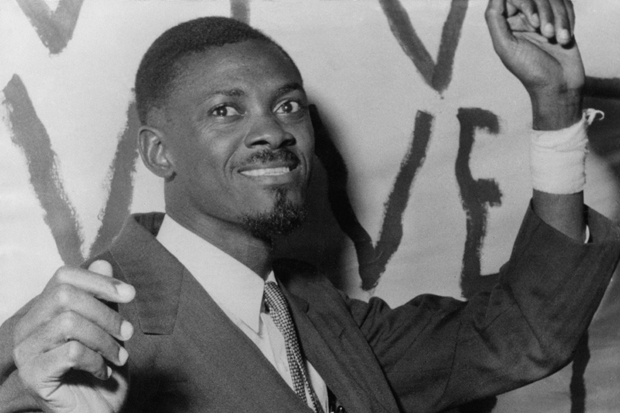For decades, all the outside world knew was that Patrice Lumumba, the Congolese independence leader, had been done away with. Like so much connected with the Congo, details were lost in the murk of Africa’s magnificent but broken giant. He had been fed to Katangan pigs, drowned in the river — or was perhaps even still alive and being held hostage in the Ituri rain-forest. So radiotrottoir assured me variously in January 2001 when I made my first visit to Kinshasa around the 40th anniversary of Lumumba’s disappearance. The reason for my trip felt darkly familiar: one of Lumumba’s successors as national leader, Laurent Kabila, had himself just been assassinated by a ‘turned’ bodyguard.
But while political violence is no stranger to the Congo, what happened to Lumumba in the early 1960s still matters. It was a time of soaring hope for Africa, the era of independence, when a continent hocked for centuries by profiteering outsiders was supposedly able at last to rise on its own. And here was a fresh-faced man, still only in his mid-thirties, who had the charisma to win the Congo’s first and only meaningful election but who was swatted away by rival powers like an irritating mosquito. To this day no one has been prosecuted for Lumumba’s death.
And this is where a book as calm, clear and authoritative as Emmanuel Gerard’s and Bruce Kuklick’s Death in the Congo adds true value. Novelists and filmmakers have all had a go at the Lumumba story, but here at last is history-writing at its most powerful: a work that reads in part like a charge sheet for a war-crimes prosecution and in part like a Shakespearian tragedy with farce thrown in.
Lumumba is described as ‘a dapper dresser and supple dancer’, with a taste for women, beer and the Congolese equivalent of marijuana. Trivial details some might say, although I disagree, knowing the role of rumba music and ostentatious socialising in Congolese public life. Next to the dullard Joseph Kasa-Vubu, Lumumba’s only credible rival for the national leadership, there was only ever going to be one popular winner. Lumumba became prime minister just as the Congo’s colonial power, Belgium, prepared to grant independence on 30 June 1960.
But as the authors show, while political legitimacy is one thing, power is something completely different. Without control of the army, Lumumba’s popular mandate was just so many crumpled voting papers bobbing down the river, and his failure to grapple with the army mutiny of July 1960, together with a manipulative Belgium urging secession on the mineral-rich province of Katanga, marked the beginning of his demise. He danced with the devil of that era, the Soviet Union, inviting Moscow to send logistical support to put down another rebellion. No matter that he kicked the Russians out soon afterwards; an American-dominated world order, so recently traumatised by Castro’s takeover of Cuba, would never forgive him.
Was Lumumba a communist? I agree with the authors that he was more of a pan-African nationalist. In light of Cuba, however, he looked sufficiently threatening for Washington to collude with Belgian colonial apologists in seeking his removal. But this book shows just how casually that was done, quoting a CIA director as saying: ‘I am relatively certain that Lumumba represented something the US government didn’t like but I cannot remember any more what it was. Was he a rightist or a leftist?’ On another occasion a Belgian emissary, arriving in the Congo, is greeted: ‘Welcome to the country of Marx — not Karl, but Groucho.’
And so began a process of political elimination. The authors demonstrate just how hypocritical President Eisenhower was in speaking publicly at the United Nations about respecting sovereign nations while privately authorising agents to get rid of the Congo’s elected prime minister. A CIA bagman with a stutter and clubfoot delivered poison to the Congo, while Belgium paid off mercenary hitmen.
In the end, Lumumba’s Congolese rivals — egged on by Brussels and Washington — used a more prosaic method than poisoned toothpaste or high-powered hunting rifles. Lumumba was placed under house arrest, detained again after he briefly escaped, beaten half to death while in prison and finally flown across the country to secessionist Katanga on 17 January 1961, where he was driven out into the bush under cover of darkness and shot by the local gendarmerie.
He was shoddily buried in a makeshift grave with — according to some accounts — his arm protruding; so he was reburied, then disinterred a second time and eventually dismembered, the body parts dissolved in battery acid. The Belgian thug responsible for this pulled out two of his teeth as souvenirs. They were capped with gold.
The drama of Lumumba’s death makes a grand finale. But the book’s true importance lies in spelling out the roles of the various powers involved, notably America and Belgium. Individual prosecutions are now unrealistic, but Death in the Congo demonstrates (something Tony Blair and George W. Bush might ponder) that it is never too late to investigate political decisions that lead to manipulation and murder.






Comments